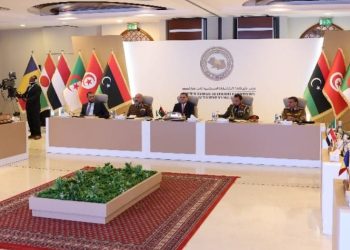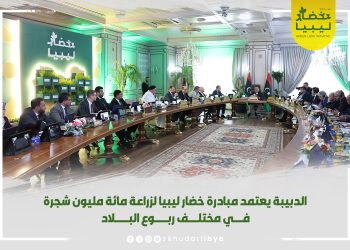By Sami Zaptia.

London, 21 September 2016:
Dr Reida El-Oakley, the eastern-based Health Minister since 2014 of the House of Representatives (HoR) recognized government of Abdullah Thinni, has been presented with an award for outstanding voluntary work by the Arab Federation of Volunteerism.
He was presented with the award at a ceremony held in Manama, Bahrain yesterday on the occasion of the Arab Day for Voluntary Work 19-21 September. The organizers said that they hoped to engrain the culture of voluntary work in the Arab world as part of a comprehensive humanitarian vision in the Arab world.
At the event the respected Oakley said that he considered his award as ‘‘an award to all the workers in the Libyan health sector in all Libyan towns and cities who work in the most difficult circumstances’’.
Oakley has been active in attempting to keep the Libyan health sector, east and west, from collapsing in the absence of Libyan political consensus and strong centralized state institutions in post-revolutionary Libya.
However, despite being a Health Minister, Oakley has also been a vocal critic of the international community and the UN-brokered Libyan Political Agreement (LPA) which was signed by the conflicting parties in Skhirat, Morocco in December 2015.
The LPA gave birth to the Faiez Serraj-led Presidency Council and its Government of National Accord (PC/GNA). The PC/GNA is supposed to be a consensual body that works on the basis of broad political agreement reflecting the political demands and concerns of all of Libya’s conflicting parties.
These broad points of agreement were supposed to include vacating main urban centres of militias, and creating a centralized and unified non local/regional/tribal-based army that is under the control of the legitimate civilian political Libyan authorities.
The LPA also prescribed that all the major leadership post of the Libyan state revert to the nine-man PC. These main leadership posts include the heads of Libyan Investment Authority, the Central Bank of Libya, the National Oil Corporation, and most controversially of all, the Supreme Commander of the armed forces.
Confusingly, the LPA, which is backed by a UN Security Council Resolution, recognizes the HoR as the sole legitimate legislative authority in Libya, while recognizing the PC/GNA as the sole executive authority in the country.
The HOR has passed a motion recognizing the LPA and its PC/GNA in principle, but has failed since the signing of the LPA in December 2015 to pass a vote approving the GNA. They have insisted that the current GNA, appointed by the PC but not approved by the HoR, is unrepresentative. The HoR has demanded that the PC put forward a third . The HoR has also objected to article 8 of the LPA which would take the position of Supreme Commander of the Armed Forces away from the HoR and Khalifa Hafter.
Until recently, the two members of the PC aligned with the HoR had boycotted the PC in objection and five of its proposed GNA ministers had resigned.
On the occasion of Reida El-Oakley receiving the prize for voluntary work, Libya Herald carried out an exclusive written question and answer interview with the HoR-recognized Health Minister.
LH: How do you see things developing in Libya? Are you feeling positive or negative and why? What is your view on the LPA and PC/GNA?
Reida Oakley: ‘‘I am concerned that the Political Dialogue (LPA) and agreeing on a Unity Government (GNA) will need much longer time than many expect. Therefore, people can be positive only if they believe that action will be taken to unify Ministries and other administrations (Central Bank of Libya included) in the east and west to provide services to the people and until a GNA is approved by the HoR’’.
‘‘Hence, we proposed a coalition between our (HoR Abdullah Thinni) Interim Government (based in Beida) and that of the Ghwail Government of National Salvation (those who swore allegiance in the HOR or GNC) until and unless a GNA is approved by the HoR. The aim is to unify the Ministries and other institutions and make them function on a tans-country level’’.
LH: What is your view on the role of UNSMIL and Martin Kobler? What are they doing wrong? What do you think they should do to improve things? Do you speak to Mr Kobler and the UN?
Reida Oakley: ”I do speak to and or email Mr Kobler once every 4-6 weeks. The UN and the international community have committed a grave mistake with the premature recognition of a GNA which did not exist in December 2015 and remains non-existent today’’.
‘‘The PC compounded that by authorizing individuals to pretend to be Ministers in a few Ministries in Tripoli! Some refused and some accepted. Five resigned. Those who accepted the appointment were rejected by the HoR last month! Sadly, the UN, Mr Kobler included, insists on calling those individuals Minsters, even invitations to represent Libya in UN-Organizations have recently been re-directed to them. Is that Legal? And where are they now’’?
LH: What ”quick victories” could be achieved in Libya to improve Libyans’ lives?
Reida Oakley: There is a need to form a coalition of Ministers who were previously approved by the HoR or GNC to unify the Ministries and make them functional in order to provide the services for the people – until a unity government (GNA) is approved by the HoR”.
LH: What is your view on the Libyan National Army (LNA) takeover of the eastern oilfields from PFG strongman Ibrahim Jadhran?
Reida Oakley: ‘‘The LNA pushing Ibrahim Jadhran out of the eastern oilfields is “just” and should have happened long ago. One UN senior staff member told me personally more than 8 months ago that Jadhran is selling crude oil on the black market without the knowledge of either my government in El Beida or the government in Tripoli”
”We have all seen the Libyan people’s sigh of relief after witnessing the Libyan National Army protecting the eastern oilfields after they had been hijacked by Jadhran and his militias who had suspended oil exports for more than three years” .
”Yet, the six major powers – in a joint statement – as well as Mr Kobler, condemned the LNA takeover of the eastern oilfields! One has to ask his- or herself why?’’
LH: Can the Libyan Political Agreement (LPA) signed in Skhirat, Morocco in December 2015 be fixed? And if so how?
‘‘The LPA can and will be fixed, but we and the international community must give enough time for the Libyan Dialogue to succeed. Post-conflict dialogues are known to take years and there is no quick fix. The mistake of creating a power and administrative vacuum is unfair on the Libyan people, who are in desperate need for very basic services such as food, medicine, education etc”.
”The UN Charter considers these as basic Human Rights. Its time that UNSMIL lived up to the Libyan people’s expectations’’, concluded Reida El-Oakley, the eastern-based Health Minister of the House of Representatives (HoR) recognized government of Abdullah Thinni.










